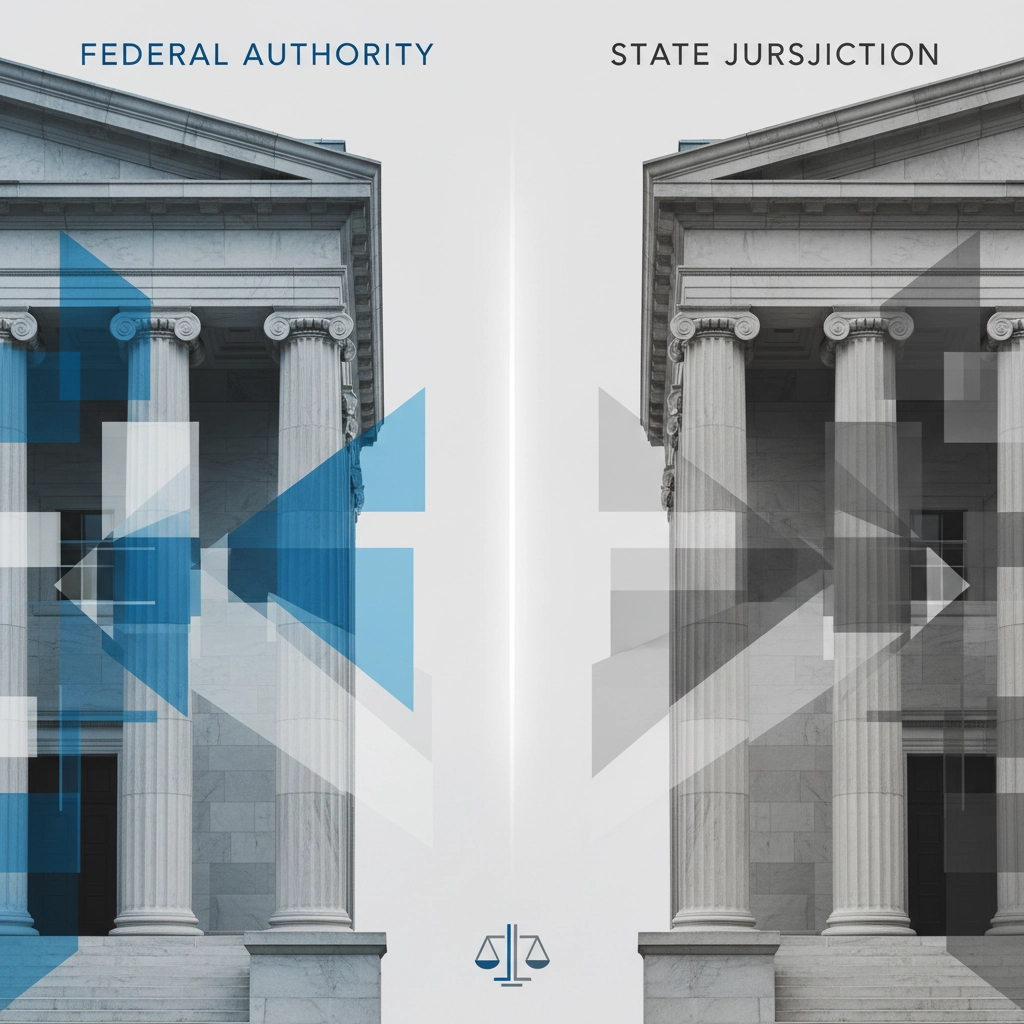Which Government Writes Criminal Laws? The Truth About Federal vs. State Authority (And Why It Matters for Your Case)
- brookthibault
- Nov 4, 2025
- 6 min read
When you're facing criminal charges, understanding who has the authority to prosecute your case can feel like navigating a maze. You might wonder: "Is this a state crime or federal crime?" The answer isn't always straightforward because both your state government and the federal government write and enforce criminal laws: but they do so in very different ways.
This dual system of authority can significantly impact your case, from which court you'll appear in to what penalties you might face. Let's break down exactly how this system works and why it matters for anyone dealing with criminal charges in Virginia.
How State Governments Write and Enforce Criminal Laws
Your state government holds the primary responsibility for creating and enforcing criminal laws that affect daily life. This authority stems from what's called "police powers": the fundamental right of states to protect the health, safety, and welfare of their citizens.
In Virginia, the General Assembly writes the majority of criminal laws you encounter. These cover the crimes that most directly impact communities: burglary, assault, domestic violence, DUI, robbery, and drug possession. Virginia's criminal code defines these offenses, establishes the elements prosecutors must prove, and sets the penalties.
For example, Virginia law defines grand larceny as stealing property worth $1,000 or more, while petit larceny covers theft of items worth less than $1,000. This distinction: and the specific dollar threshold: exists because Virginia's legislature chose to write the law this way. Other states set different thresholds, creating a patchwork of criminal laws across the country.
State courts in Virginia handle the vast majority of criminal cases. When you're arrested by Virginia Beach police for a DUI or charged with assault in Norfolk, you'll typically appear in Virginia state court, not federal court.

Federal Criminal Law Authority and Scope
The federal government writes criminal laws addressing matters that cross state boundaries or affect national interests. Unlike states, which have broad police powers, the federal government can only criminalize conduct that falls within its specific constitutional authorities.
These constitutional powers include regulating interstate commerce, providing for national defense, operating the postal system, and managing immigration. Federal crimes often involve:
Interstate commerce violations: Drug trafficking across state lines, wire fraud affecting multiple states
Federal property crimes: Offenses committed on military bases, national parks, or other federal property
Immigration offenses: Illegal entry, visa fraud, human trafficking
Financial crimes: Bank robbery, counterfeiting, tax evasion
Organized crime: RICO violations, large-scale drug operations
The Department of Justice, through U.S. Attorneys' offices, prosecutes federal crimes. In Virginia, the Eastern District and Western District U.S. Attorneys handle federal prosecutions.
When Federal Law Takes Priority
Here's where it gets crucial for your case: when federal and state laws conflict, federal law wins. This principle, established in the landmark case McCulloch v. Maryland (1819), means federal courts can override state decisions and federal prosecutors can step into cases that might otherwise be handled at the state level.
This doesn't mean federal authorities always take over. In fact, they handle only a small percentage of criminal cases nationwide. However, federal prosecutors have broad discretion to decide when to get involved, especially in cases where both state and federal laws are violated.
Virginia-Specific Examples of Overlapping Authority
Understanding how this plays out in Virginia can help you better grasp what might happen in your situation.
Drug Crimes: If you're caught with cocaine in Virginia Beach, you could face state charges under Virginia's drug laws. However, if federal agents believe you were trafficking drugs across state lines or the quantity suggests interstate distribution, federal prosecutors might file charges under federal drug trafficking statutes: which typically carry harsher penalties.
Gun Crimes: Virginia has its own firearms laws, but federal authorities often prosecute gun crimes when they involve interstate commerce (like purchasing firearms in another state) or when the defendant has prior felony convictions that make gun possession federally illegal.
Domestic Violence: Typically handled in Virginia state courts, domestic violence cases can become federal matters if they involve crossing state lines to commit the offense or violating federal protective orders.
White Collar Crimes: A fraud case affecting only Virginia residents might stay in state court, but if the scheme used mail, wire communications, or affected federally insured banks, federal prosecutors could take jurisdiction.

Why Jurisdiction Matters for Your Case
The difference between state and federal prosecution isn't just academic: it can dramatically affect the outcome of your case:
Different Penalties: Federal sentences are often harsher than state sentences for similar crimes. Federal drug trafficking charges, for instance, typically carry longer mandatory minimum sentences than Virginia state charges.
Different Courts: Federal courts operate under different rules and procedures than Virginia state courts. Federal judges are appointed for life and may have different perspectives than elected state judges.
Different Resources: Federal prosecutors often have more resources for complex investigations and may be more likely to pursue cases aggressively.
Plea Bargaining: The culture around plea negotiations can differ significantly between federal and state systems.
How Cases Get Allocated Between Systems
Several factors influence whether your case ends up in state or federal court:
Nature of the Crime: Crimes that clearly fall within federal jurisdiction (like immigration offenses) go to federal court, while traditional state crimes (like simple assault) typically stay in state court.
Resources and Priorities: Federal prosecutors focus their limited resources on cases that align with current Department of Justice priorities, which can shift based on national concerns and political directives.
Severity and Complexity: More serious or complex cases are more likely to attract federal attention, especially if they involve organized criminal activity or significant financial losses.
Interstate Elements: Any crime that crosses state boundaries increases the likelihood of federal involvement.

What This Means for Your Defense Strategy
Understanding who has authority over your case helps you and your attorney develop the most effective defense strategy:
Know Your Prosecutors: Federal and state prosecutors have different approaches, resources, and motivations. Your defense strategy should account for which system you're in.
Understand Potential Penalties: The same conduct might result in very different sentences depending on whether you're prosecuted in state or federal court.
Consider Plea Options: Plea bargaining practices vary significantly between federal and state systems.
Prepare for Different Procedures: Federal court procedures, discovery rules, and trial practices differ from Virginia state courts.
Protecting Your Rights in Either System
Regardless of whether you're facing state or federal charges, certain principles remain constant:
You have the right to competent legal representation familiar with the specific court system handling your case. Federal cases require attorneys admitted to practice in federal court and experienced with federal procedures and sentencing guidelines.
You have the right to understand the charges against you and the potential penalties. Don't assume that because you're familiar with Virginia state law, you understand how federal law might apply to your situation.
You have the right to challenge the government's evidence and present a defense, whether in state or federal court.
Getting the Right Legal Help in Virginia
Navigating the complexities of state versus federal criminal law requires local expertise combined with an understanding of how these systems interact. The jurisdiction of your case affects everything from court procedures to potential penalties, making it essential to work with attorneys who understand both systems.
At Coastal Virginia Law, we provide experienced criminal defense representation for clients facing both state and federal charges throughout the Hampton Roads area. Our team understands how Virginia's criminal laws interact with federal authority and can help you navigate whichever system handles your case.
Whether you're dealing with state charges in Virginia Beach Circuit Court or federal charges in the Eastern District of Virginia, having knowledgeable legal representation can make the difference between a favorable outcome and a devastating conviction.
If you're facing criminal charges and need to understand your options, don't wait to seek legal guidance. The sooner you understand which government has authority over your case and what that means for your defense, the better positioned you'll be to protect your rights and your future.
Contact Coastal Virginia Law today to discuss your case with attorneys who understand both Virginia state law and federal criminal procedure. Your freedom and future are too important to leave to chance.


Comments